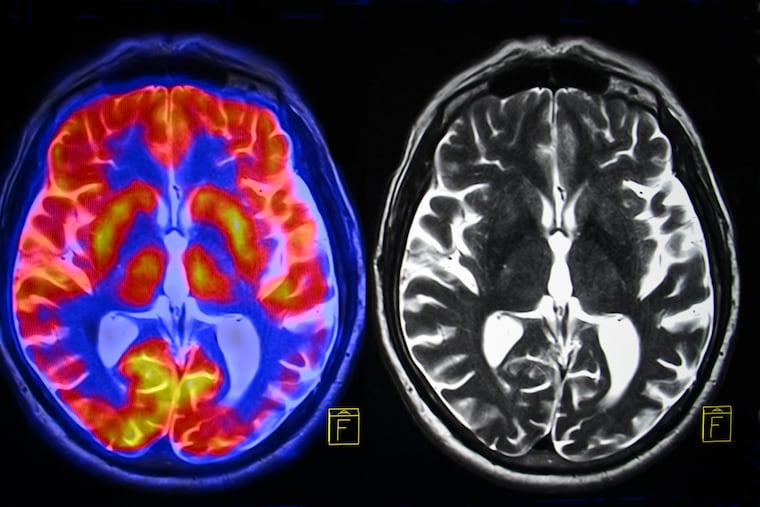Are bigger brains smarter? Barely, says study led by Penn scholar.
Using MRIs from more than 13,000 people, the authors found that each additional "cupful" of brain volume was correlated with 5 additional months of educational attainment, on average.

How often have you heard a smart person draw praise for having a big brain?
It may be just an expression, but according to a new study led by a University of Pennsylvania researcher, that notion contains a glimmer of literal truth.
An analysis of MRIs from 13,600 people revealed a slight correlation between brain volume and scores on a test of “fluid” intelligence — a measure of logic and reasoning ability.
The bigger-is-smarter relationship held true regardless of socioeconomic status for the people in the study.
But brain volume accounted for just 2.1 percent of the variation in how well the study participants performed on the intelligence test. And while men have larger brains than women on average, their test scores were no better.
That suggests other factors play a much bigger role in intelligence, such as perhaps the size of certain regions of the brain or the quality of the connections between them — a hypothesis the researchers plan to examine in future studies. For example, previous research has found that the cortex, an outer layer of gray matter in the brain, tends to be thicker in women, said lead author Gideon Nave, an assistant professor of marketing at Penn’s Wharton School.
“Men have bigger brains, but at the same time they are not more intelligent than females,” said Nave, an expert in computational neuroscience who studies how people make decisions. "It suggests that there are some other things that compensate.”
The impact of brain size on intelligence has been studied for more than a century, but the results have varied even since more precise measurements became possible with the advent of MRIs. Generally, larger studies have tended to find a weaker connection between brain size and intelligence. So Nave and the co-leader of the study, Philipp Koellinger of Free University Amsterdam, decided to study the topic using more participants than all previous such studies combined.
Drawing from a larger project called the UK Biobank, they identified 13,600 people who had undergone both brain MRIs and intelligence tests. The authors also opted to “pre-register” their study, meaning they agreed to publish the results no matter what they found. The idea was to guard against publication bias — the phenomenon in which academia is less likely to publish studies without significant findings, which had happened with some previous research on brain size.
Though the researchers found a connection between brain size and intelligence, it was weak. The participants included lots of people with smaller brains but quick wits, and plenty of larger-brained folks who were not so sharp. In statistical terms, the correlation between brain volume and smarts was 0.19 (on a scale of zero to one).
The authors did not delve into the issue of brain size and race, which has been plagued by biased research in the past. All participants in the new study were of European descent.
John D. Mayer, a University of New Hampshire psychology professor who was not involved with the new study, said it was no surprise that brain size would play some role in intelligence. Broadly speaking, that rule holds true across the animal kingdom. But within the range of human intelligence, many other factors clearly are at work, he said.
“There may be certain qualities of how the brain is, for lack of a better technical term, wired, or the nature of the neurons in a person’s brain, their environment, and the education they receive, which also contribute to their ability to solve problems,” Mayer said.
Penn psychology professor Joseph W. Kable, one of Nave’s co-authors, agreed.
“Brain size isn’t everything,” he said.
The researchers also found that on average, people with larger brains tended to finish more years of school, but again, the connection was weak.
Said Mayer:
“If you have a small brain, don’t worry. And if you have a very large brain, you should not get overconfident.”
The answer to the sample question is B (26).